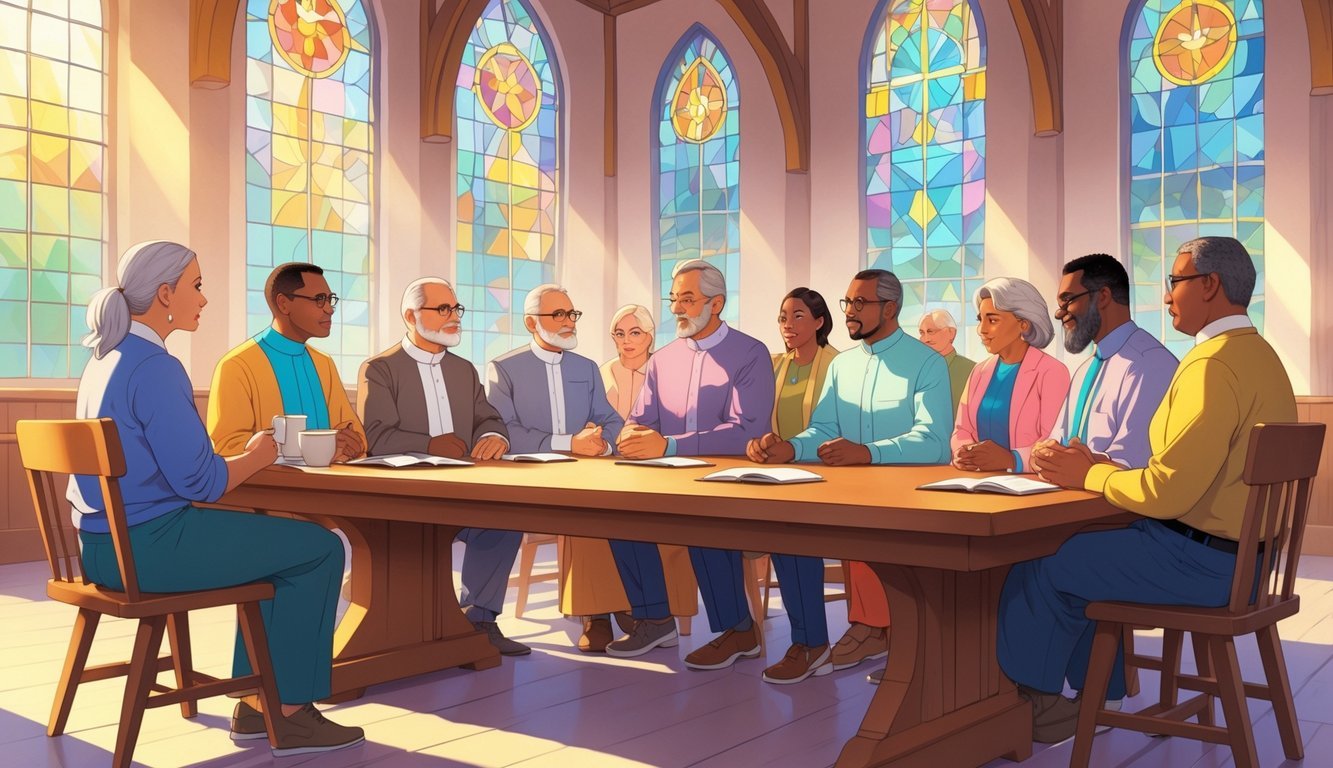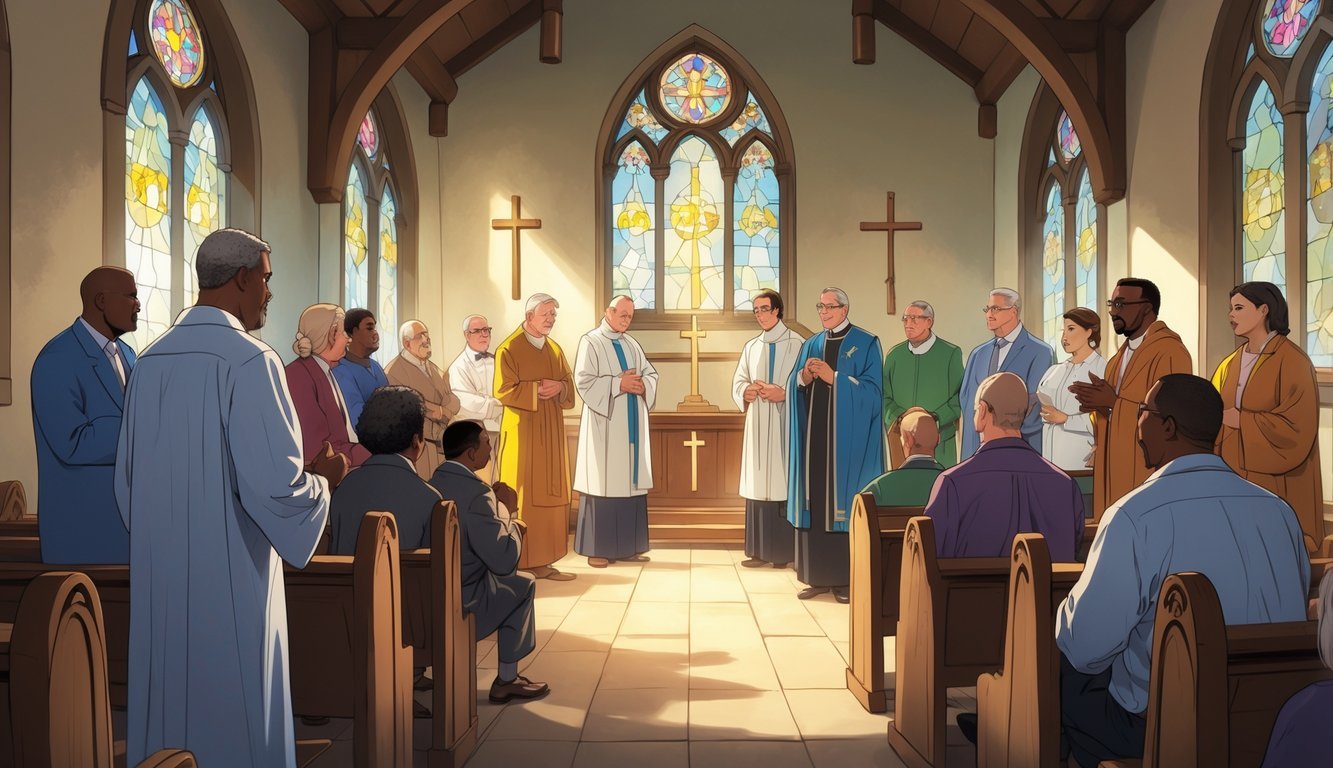Physical Address
304 North Cardinal St.
Dorchester Center, MA 02124
Physical Address
304 North Cardinal St.
Dorchester Center, MA 02124
Conflicts in Christian churches arise from misunderstandings, pride, and differing opinions, often hindering unity and mission. Effective resolution requires humility, clear communication, and prayerful engagement.

Internal conflicts in Christian churches usually spring up from hurt feelings, misunderstandings, or personality clashes.
These struggles can slow down a church’s mission and make it tough for members to feel connected.
If you want your church community to stay strong and united, you’ve got to understand what’s really causing these conflicts.

Pride and a lack of spiritual or emotional maturity often make things worse.
Change is hard for a lot of people, and resistance can crank up the tension.
Are you tired of spinning your wheels and getting nowhere? Simply put, you’re out of sync: you’re out of alignment with your astral configuration.
But: there’s a kind of map that can help you reclaim your alignment. Think of it as your own personal blueprint to success and happiness: a blueprint that will help you live your most amazing life.
Get started here.
If you address these issues with love and patience, you’ll help restore peace and build healthier relationships in your church.
When conflicts pop up, focusing on faith, humility, and prayer can really steer you toward healing.
Learning to handle disagreements with care makes your church a place where folks feel valued and heard.

Conflicts often happen because church members have different views, roles, or ways of relating.
If people don’t handle these differences well, tension spreads through the whole community.
Church leaders sometimes disagree.
You might notice pastors or elders arguing over worship styles, budgets, or who should lead certain ministries.
Even small disagreements can grow when power struggles or control issues get involved.
Church politics can make things messier.
People tend to support different leaders out of loyalty or personal beliefs.
This division leads to cliques and hurt feelings, especially if leaders don’t communicate openly.
When leadership conflicts show up, members can feel stuck in the middle and unsure who to trust.
People sometimes argue about what the Bible actually teaches.
For instance, some churches debate Arianism or other beliefs that affect how they see Jesus and salvation.
These arguments happen in all sorts of groups, even Baptist churches.
Members bring different backgrounds and ways of interpreting the Bible.
You might hear disagreements about baptism methods, church roles, or what certain scriptures really mean.
If nobody handles these issues with care, they can split the church.
A lot of conflicts come from simple personal differences.
Maybe you like one style of worship, but someone else prefers another.
These issues seem minor at first but can grow if people don’t listen to each other.
Communication problems make things worse.
Unclear messages or hurt feelings lead to misunderstandings.
If people won’t forgive or talk honestly, small problems can turn into big fights.
Learning to communicate well and respect different preferences does a lot to prevent these conflicts.

When conflicts show up in your church, you need to handle them with care and clear steps.
Focus on humility, unity, and using solid peacemaking methods.
This helps keep relationships healthy and the church’s mission on track.
Start with humility.
Be willing to listen and admit mistakes without letting pride get in the way.
If you set aside selfishness, it encourages others to do the same.
Unity really matters.
The goal is to keep the church connected and reflect the gospel’s message of love and forgiveness.
Don’t hide your true feelings behind masks, but also try not to blame others.
Pray and ask God for guidance before you talk about problems.
This helps open your heart to understanding others.
When everyone focuses on restoring relationships instead of winning, unity starts to grow.
Use clear communication to manage conflicts.
Be open and honest about issues, but avoid attacking anyone.
A lot of conflicts just come from misunderstandings or different views on church resources and values.
Try a peacemaking process—calmly discuss the problem, look for common ground, and agree on a solution.
Sometimes, you’ll need a mediator if things get complicated.
Keep your focus on constructive conflict.
Disagreements can be chances to grow and learn together, not just reasons to split up.
Transparency and a shared commitment to the church’s mission help keep conflicts from getting worse.
Take initiative by speaking first and showing a willingness to forgive.
This follows what Jesus taught and invites peace back in.

You might wonder how to handle disagreements in your church or what usually causes them.
Knowing how to address conflicts, learning from early church examples, and following scriptural advice can help you tackle these issues.
Start by talking privately with the person involved.
If the issue sticks around, bring in a small group or leaders to help mediate.
This follows what Jesus taught in Matthew 18—open, humble communication instead of just avoiding the problem.
People often disagree because of pride or selfishness.
Emotional and spiritual immaturity can make it even harder to work through conflicts.
Differences in opinions about church leadership or interpreting Scripture also spark arguments.
Paul wrote letters urging churches to stay united and avoid selfishness.
He kept reminding them to focus on love and peace.
He also corrected false teachings and encouraged members to listen to each other with respect.
The Bible talks a lot about forgiveness, patience, and humility.
You’re encouraged to seek peace and work toward reconciliation.
Verses like Ephesians 4:2-3 tell you to be gentle and keep unity through the bond of peace.
A church might run into trouble when members can’t agree on who should lead or how to spend money.
Sometimes, problems start when someone feels hurt but nobody else even realizes it, which leads to misunderstandings.
Churches run into conflicts over big things, like theology or who’s in charge.
Smaller issues can pop up too, and honestly, people sometimes just let them slide.
Personal pride can spark fights.
Other times, folks wrestle with emotional or spiritual struggles that fuel the tension.